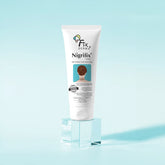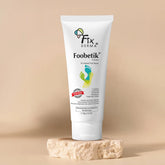How Does Gut Health Support Naturally Healthy Skin?

Tables of Content
- The Gut-Skin Axis: How Gut Health Affects Skin
- The Benefits of Gut Health for Skin
- Key Elements of Gut Health for Skin
- Skin Conditions Linked to Gut Health
- How to Improve Gut Health for Glowing Skin?
- Natural Ways to Improve Gut and Skin Health
- Recognizing the Signs of Poor Gut Health on Skin
- Anti-Aging Benefits of Gut Health for Skin
- Key Takeaways: Healthy Gut For A Naturally Healthy Skin
- Frequently Asked Questions (FAQs)
The phrase “beauty comes from within” isn’t just a saying; it’s rooted in science, particularly in the gut-skin connection. Increasingly, researchers are discovering how profoundly gut health influences skin health, affecting everything from acne and inflammation to anti-aging and hydration. This connection is part of what scientists call the gut-skin axis, a fascinating communication system between the gut and skin that ensures a balanced microbiome, which is essential for both digestive and skin health.
This blog dives deep into the gut-skin relationship, exploring the ways gut health directly impacts skin and revealing practical strategies for achieving naturally radiant skin by nourishing your gut.
The Gut-Skin Axis: How Gut Health Affects Skin
The gut-skin axis refers to the complex communication pathway between your digestive system and skin, with the gut microbiome serving as a critical point of influence. When the gut is healthy and balanced, it regulates inflammatory responses, keeps immune reactions in check, and promotes effective nutrient absorption—all factors that directly benefit the skin. An imbalance in gut health, however, can lead to skin issues such as acne, rosacea, and signs of premature aging.
This connection is influenced by the diversity of bacteria within the gut. A balanced microbiome with a healthy ratio of good bacteria can support skin health by reducing inflammation, managing oxidative stress, and providing essential nutrients.
The Benefits of Gut Health for Skin

A healthy gut does wonders for your skin by reducing inflammation and balancing hormonal responses that can cause acne, dullness, and dryness. Here are the key benefits of gut health for the skin:
- Reduced Inflammation: By maintaining a balanced gut microbiome, inflammation in the body, and consequently in the skin, is minimized.
- Better Nutrient Absorption: Nutrients critical to skin health, such as vitamins C, D, and E, and essential fatty acids, are better absorbed by a well-functioning gut, leading to a naturally radiant complexion.
- Balanced Oil Production: A healthy gut reduces excessive oil production, which helps control acne and dryness, keeping your skin smooth and clear.
In short, the gut health and skin connection offers significant benefits for a naturally glowing complexion.
Key Elements of Gut Health for Skin

-
Probiotics for Skin Health
Probiotics for skin health are among the most powerful tools in gut care. These beneficial bacteria restore and maintain a balanced gut microbiome, which plays a vital role in reducing inflammation, balancing the immune response, and promoting clear skin.
How to Incorporate Probiotics:- Eat fermented foods: Foods like yogurt, kimchi, kefir, and sauerkraut are rich in natural probiotics.
- Consider probiotic supplements: Supplements provide targeted support for beneficial bacteria, especially if your diet lacks fermented foods. Look for high-quality options with diverse strains to optimize gut health.
-
Prebiotics and Skin Health
While probiotics introduce good bacteria into the gut, prebiotics serve as food for these bacteria, helping them thrive. Prebiotics are naturally found in foods like garlic, onions, bananas, and oats. By fueling beneficial bacteria, prebiotics contribute to a balanced microbiome, which directly benefits the skin.
A diet rich in prebiotic foods keeps the gut and skin healthy, often leading to reduced sensitivity, fewer blemishes, and improved resilience against environmental stressors. -
Gut-Friendly Foods for Skin Health
The foods you eat play an essential role in maintaining gut health, which, in turn, supports skin health. Some of the best foods for gut and skin health include:- Leafy greens, nuts, and whole grains: These provide fiber and vitamins essential for gut health and skin repair.
- Hydrating fruits and vegetables: Cucumbers, watermelons, and oranges provide hydration and are rich in antioxidants, supporting both gut and skin health.
- Omega-3 fatty acids: Foods like salmon, flaxseeds, and walnuts have anti-inflammatory properties that can reduce skin redness and acne.
Skin Conditions Linked to Gut Health

Poor gut health doesn’t just stay in the gut—it often appears on the skin. Here’s how conditions like acne, eczema, and rosacea are linked to gut health:
-
Gut Microbiome and Acne
An imbalanced gut can lead to systemic inflammation, which is a known trigger for acne. When gut health is compromised, it can affect the way the body handles oil production and immune responses, making breakouts more common. Studies show that a balanced microbiome can significantly reduce acne by regulating inflammatory responses and hormone levels. -
Other Skin Conditions Linked to Gut Health
Other conditions, such as eczema, rosacea, and psoriasis, are also connected to gut health. When the gut microbiome is out of balance, it often leads to skin issues that manifest as redness, irritation, or sensitivity. Addressing gut health through diet and lifestyle can help manage these skin issues naturally.
The gut-skin axis emphasizes that skin conditions are often reflective of internal imbalances. Addressing these imbalances can offer long-term relief from skin concerns.
How to Improve Gut Health for Glowing Skin?

To support naturally healthy skin, consider the following steps to improve your gut health:
-
Focus on a Gut Health Diet for Skin
A gut health diet for the skin consists of nutrient-rich foods that fuel beneficial bacteria while reducing inflammation. Here’s what to include:- Fiber-rich foods: Whole grains, beans, and vegetables support the growth of beneficial bacteria.
- Antioxidant-rich fruits and vegetables: Berries, spinach, and sweet potatoes reduce oxidative stress and support a healthy gut.
- Healthy fats: Avocados, nuts, and seeds provide skin-hydrating fats essential for a radiant complexion.
-
Include Fermented Foods for Skin Benefits
Fermented foods and skin benefits highlight the importance of probiotic-rich foods, which help enhance the gut microbiome. Foods like kefir, kimchi, and miso are loaded with beneficial bacteria that reduce inflammation, control acne, and support a clear complexion. -
Gut Health Supplements for Clear Skin
Incorporating gut health supplements for clear skin, like and prebiotics can offer targeted support for a balanced microbiome. Other beneficial supplements include: These supplements promote gut health while also delivering direct skin benefits, helping to create a clearer, brighter complexion. -
Embrace the Gut-Brain-Skin Connection
The gut-brain-skin connection reveals how mental well-being impacts both gut and skin health. Chronic stress disrupts the gut microbiome, triggering inflammation and skin issues. Incorporating stress management techniques such as mindfulness, regular exercise, and adequate sleep can help maintain a healthy gut-brain-skin axis, supporting clearer, calmer skin.
Natural Ways to Improve Gut and Skin Health

Beyond diet and supplements, there are simple lifestyle changes that can benefit both gut and skin health:
- Hydrate Regularly: Staying hydrated is crucial for digestion, nutrient absorption, and skin hydration. Drinking plenty of water supports the gut microbiome, which can help reduce inflammation and boost skin moisture levels, giving it a natural glow.
- Embrace Fiber-Rich Foods: Fiber is essential for gut health because it helps balance digestion and encourages the growth of beneficial bacteria. Foods like oats, beans, and apples provide both soluble and insoluble fiber, which helps detoxify the body and maintain clear skin.
- Cut Down on Sugar: Excessive sugar intake disrupts the gut microbiome and can lead to skin issues such as acne. Reducing sugar intake can benefit both gut and skin health by reducing inflammation and oxidative stress, especially for those prone to acne and irritation.
Recognizing the Signs of Poor Gut Health on Skin

Skin is often the first place you’ll notice signs of poor gut health. Some common indicators include:
- Persistent acne or breakouts: Often linked to inflammation originating from the gut.
- Redness or sensitivity: This is the result of an imbalanced microbiome.
- Dry or flaky patches: Poor gut health affects the skin’s natural moisture balance.
- Premature aging: Gut imbalances Oxidative stress from gut imbalances may lead to fine lines and dullness.
Addressing these issues by improving gut health can improve the skin’s texture, tone, and radiance over time.
Anti-Aging Benefits of Gut Health for Skin
Maintaining a balanced gut microbiome is a powerful anti-aging strategy. A healthy gut microbiome reduces oxidative stress and inflammation, which are major contributors to premature skin aging. Foods rich in antioxidants and healthy fats, such as berries, salmon, and olive oil, help protect skin from environmental damage, while probiotics and prebiotics maintain elasticity and hydration.
How to Support Anti-Aging with a Healthy Gut?

- Incorporate antioxidant-rich foods: Berries, green tea, and dark chocolate combat free radicals that lead to aging.
- Include healthy fats: Avocados, nuts, and fatty fish support skin hydration and reduce the appearance of fine lines.
- Manage stress: Practicing relaxation techniques can positively impact the gut-brain-skin connection, leading to healthier skin over time.
Key Takeaways: Healthy Gut For A Naturally Healthy Skin
The relationship between gut health and skin is intricate but impactful. By nurturing your gut through a balanced diet, incorporating probiotics and prebiotics, and making lifestyle changes, you can achieve healthier, more resilient skin. From reducing inflammation to promoting nutrient absorption, improving gut health provides a natural path to radiant skin. Whether your goal is to address acne, reduce redness, or achieve a youthful glow, prioritizing your gut health is a foundational step in your skincare journey. Embrace the gut-skin connection to enjoy lasting benefits for both your complexion and overall well-being.
Frequently Asked Questions (FAQs)
-
Can improving my gut health help reduce skin sensitivity?
Yes, improving gut health can help reduce skin sensitivity. A balanced gut microbiome supports the skin’s barrier function, which helps protect against irritants and allergens that can cause r. By nourishing the gut with probiotics, prebiotics, and fiber-rich foods, you can strengthen your skin’s resilience, making it less reactive to environmental triggers. -
How long does it take to see skin improvements after starting a gut-healthy diet?
Results can vary, but many people begin noticing skin improvements within 4 to 6 weeks of adopting a gut-friendly diet. This time frame allows beneficial bacteria in the gut to establish balance and reduce systemic inflammation, leading to clearer, more radiant skin. For some, improvements may be gradual, but consistency with a gut-healthy diet can lead to lasting skin benefits. -
What signs show a link between poor gut health and skin issues?
Skin issues like acne, dryness, redness, and inflammation can indicate gut imbalances. Digestive problems, bloating, or irregular bowel movements often accompany these skin concerns. Addressing gut health may help alleviate these symptoms and support a clearer complexion. -
How can a healthy diet promote better gut and skin health?
A diet rich in fiber, antioxidants, and probiotics helps nourish good gut bacteria and reduce inflammation. Foods like leafy greens, berries, yogurt, and fermented foods support a balanced gut, which can improve skin tone, hydration, and overall resilience against irritation. -
What lifestyle changes benefit both gut and skin health?
Regular exercise, sufficient hydration, stress management, and a diet low in processed foods benefit both the gut and skin. These habits reduce inflammation, encourage beneficial gut bacteria, and boost circulation, which in turn supports skin’s elasticity, glow, and barrier function. -
Can stress affect both my gut health and my skin condition?
Absolutely. Stress impacts the gut-brain-skin axis, a system where the gut, brain, and skin communicate closely. High-stress levels can disrupt gut bacteria, leading to digestive issues and inflammation, which often show up on the skin as breakouts, redness, or dullness. Practicing stress management techniques—like meditation, exercise, and sufficient sleep—can help maintain gut balance and improve skin health over time.








